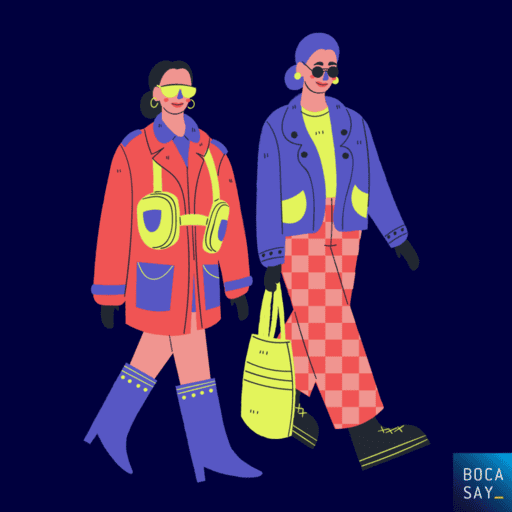Software development in the fashion/textile sector
Considering how digital technologies have already had a major impact on every aspect of our daily lives, it is perhaps rather unsurprising that the global fashion industry is also currently going through its very own digital transformation period.
One of the world’s largest industries, the global fashion market is projected to reach $3.3 trillion by 2030. Many brands and designers are embracing the latest tech in order to transform manufacturing, production, marketing and wearability.
By deploying artificial intelligence, mobile commerce, 3D printing and blockchain technologies, it is now highly evident that the fashion world is rapidly incorporating the latest digital technologies and preparing for a digital future.
The global fashion design and production software market is forecasted to reach $2,7 billion by the year 2027.
In this article, Bocasay’s offshore outsourcing company will showcase some of the top digital technologies currently being used by today’s fashion industry.

Software applications in the fashion industry
Computer-Aided Design (CAD)
Today’s fashion designers can use robust software to first envision their ideas on a computer monitor before they are put into mass production. Originally , the use of CAD for fashion design grew from scanning existing textile patterns and then easily producing new and unique patterns. Not only does CAD increase a fashion designer’s productivity, but it also significantly improves the overall quality of design itself. Accurate and efficient, CAD also functions as a manufacturing database that enables designers to produce and implement new ideas at a much faster rate.
Smart Fabrics
Simply put, smart fabrics are potentially the best solution for establishing a more sustainable future for the global fashion industry. Ever wanted a shirt that could keep you cool in the summer and warm during winter? Imagine a t-shirt that changes color according to your mood, natural lighting, or when you receive an email.
Tech-giant Google is already working on producing touch-responsive textiles that are made from conductive threads and will be able to change color in relation to moods, user settings and temperatures. Smart fabrics will ultimately revolutionize our everyday clothes.
3D Printing & Scanning
As of 2022, many global fashion brands have embraced the advancements in 3D printing technologies in order to offer their clients anything from accessories to designer clothes. Most importantly, by establishing new methods for customization and sustainability, 3D-printing clothes on-demand results in 35% less fabric waste.
In addition, 3D scanning software helps designers and manufacturers to produce clothes according to accurate body measurements and proportions, basically making clothes that fit perfectly. Fashion designers benefit from software that can virtually test how clothes will look on a particular body type.
Artificial Intelligence (AI)
Much like many other industries, fashion brands have been using AI to :
- Improve their customers’ experiences.
- Analyze market data.
- Boost sales.
- Offer personal product suggestions.
From customer service chatbots, trend forecasting and supply-chain management, AI can offer fashion companies a wide range of competitive advantages.
Another inspiring application with huge potential for fashion retailers is automated versioning. This refers to an AI and machine learning algorithm that can build multiple versions of a single human model, enabling the development of virtual fitting rooms, reducing waste and returns, as well as offering the customer more convenience and accuracy.
ℕ𝕠 𝕤𝕠𝕗𝕥𝕨𝕒𝕣𝕖 𝕞𝕖𝕖𝕥𝕤 𝕪𝕠𝕦𝕣 𝕖𝕩𝕡𝕖𝕔𝕥𝕒𝕥𝕚𝕠𝕟𝕤? 𝕐𝕠𝕦 𝕕𝕠𝕟’𝕥 𝕜𝕟𝕠𝕨 𝕨𝕙𝕚𝕔𝕙 𝕒𝕡𝕡𝕝𝕚𝕔𝕒𝕥𝕚𝕠𝕟 𝕥𝕠 𝕔𝕙𝕠𝕠𝕤𝕖? 𝔻𝕠𝕟’𝕥 𝕙𝕖𝕤𝕚𝕥𝕒𝕥𝕖 𝕒𝕟𝕪 𝕝𝕠𝕟𝕘𝕖𝕣 𝕒𝕟𝕕 𝕕𝕖𝕧𝕖𝕝𝕠𝕡 𝕪𝕠𝕦𝕣 𝕤𝕠𝕗𝕥𝕨𝕒𝕣𝕖 𝕠𝕣 𝕔𝕦𝕤𝕥𝕠𝕞 𝕒𝕡𝕡𝕝𝕚𝕔𝕒𝕥𝕚𝕠𝕟 𝕨𝕚𝕥𝕙 𝔹𝕠𝕔𝕒𝕤𝕒𝕪’𝕤 𝕠𝕗𝕗𝕤𝕙𝕠𝕣𝕖 𝕠𝕦𝕥𝕤𝕠𝕦𝕣𝕔𝕚𝕟𝕘 𝕔𝕠𝕞𝕡𝕒𝕟𝕪 ! 𝔻𝕚𝕤𝕔𝕠𝕧𝕖𝕣 𝕠𝕦𝕣 𝕥𝕒𝕝𝕖𝕟𝕥𝕖𝕕 𝕥𝕖𝕒𝕞𝕤 𝕠𝕗 𝕕𝕖𝕧𝕖𝕝𝕠𝕡𝕖𝕣𝕤, 𝕒𝕟𝕕 𝕖𝕟𝕥𝕣𝕦𝕤𝕥 𝕥𝕙𝕖𝕞 𝕨𝕚𝕥𝕙 𝕪𝕠𝕦𝕣 𝕡𝕣𝕠𝕛𝕖𝕔𝕥!
Internet of Things (IoT)
The IoT is one of the most exciting tech developments that has the potential to drastically transform the fashion industry. From smart watches, responsive sportswear, multi-function designs and all the way to smart clothing, brands are essentially developing networked wearable objects that can exchange data over the internet.
Amazing examples that are already available include smart socks that can count your steps and calories, as well as powered suits that can react to the body’s natural movements, enhancing a user’s muscle power and basically providing strength for getting up, sitting down or staying upright.
Mobile Commerce
Mobile commerce, or mobile shopping, is one of the fastest growing sectors of e-commerce in general. As consumers take advantage of ever-improving smartphones, as well as digital payment options like Apple and Android Pay, it has never been easier to purchase almost anything on-the-go from a mobile device.
In addition, with social media channels radically changing the way we interact with both individuals and businesses, fashion brands can now have a robust presence on all of their customers’ favorite online channels, establishing unprecedented brand visibility and increasing their sale opportunities. There are also sustainable fashion apps like Depop and Vinted that specialize in second-hand fashion sales.

Virtual Reality (VR)
Fashion retailers have used VR in order to combine the online and physical worlds of retail. In its most practical application, VR technology is enabling online customers to virtually try different outfits before purchasing.
Providing unparalleled accuracy and customized measurement functionality, it enables customers to efficiently try and buy various products even if they are not present in a physical store.
Moreover, VR can also be used to provide customers with 3D and 360 degree shopping experiences – basically virtual stores – all easily accessible on brand websites, mobile apps and social media channels.
Blockchain Technology
Blockchain technology has been a game-changer for optimizing supply-chains in a wide range of industries. It is the best digital tool for establishing supply-chain transparency, traceability and efficiency for all parties involved. From banks, carriers and intermediaries, everyone can have a direct and secure connection and access to relevant key data.
Companies like TextileGenesis use blockchain technology in order to keep a record of every aspect of production and to make their operational processes more sustainable. As every single product that moves along the supply-chain is instantly recorded on the blockchain, this significantly helps in the prevention of counterfeit products because anything missing a digital-physical link will be an obvious fake.